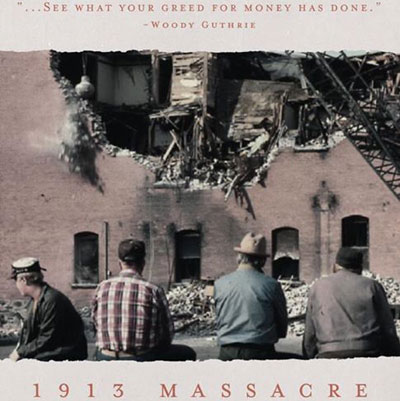
1913 Massacre is a touching documentary that revisits the tragic events that took place in the copper mining town of Calumet in the northern tip of Michigan on Christmas Eve 1913. The film starts with a title card explaining the tragedy: “On Christmas Eve 1913, in the town of Calumet, Michigan, striking miners and their families were gathered for a party at the Italian Hall. Someone in the hall hollered “Fire!” The crowd panicked and ran for the door. 73 people were crushed to death. 59 of the dead were children. . . . There was no fire in the Italian Hall.
Rather than the traditional voiceover, this movie is structured around Arlo Guthrie’s visit to Calumet as he sings lines from his dad’s classic song, “1913 Massacre,” acting as troubadour/narrator interspersed throughout the film. It creates a powerful emotional impact. (You might want to listen to Woody’s original version while you read the rest of this article.)
“Take a trip with me in 1913, to Calumet, Michigan in copper country,” the song opens, and proceeds to tell the terrible story that took place that fateful night.
People came from all over the world to work in Calumet, including from Poland, Croatia, England, and Finland. Calumet and Hecla Mines hired as many as 25,000 miners making as little as 25 cents a day. Working conditions were extreme, many men losing their lives going down a mile into the earth to bring out copper that fed deep profits for the company bosses. Most workers failed to catch the light of day, with a few hours sleep, before another dark day started in the deep tunnels. It was an industry town, and miners were divided on their willingness to form a union. Some had the guts to fight and risk their jobs for better conditions and pay, while others just accepted their lot.
It was a time of strikes, with workers fighting for better pay, shorter workdays, safer working conditions and union recognition. But there were miners fighting miners also. There’s a historical debate among the townsfolk about whether the doors of the hall swung inwards or outwards. Those defending the “inward” theory place blame on the building structure, while the “outward” theory places blame on folks who held the doors shut knowing they were causing panic within the hall stairwell. But then the question is “Who yelled ‘Fire!’ and what did they expect would happen?” Anti-unionism took on a deathly reality that still plagues relationships in this small town.
Over half those who died were children between 6 and 10 years old. One of the most striking scenes in the film shows dozens of tiny white coffins being carried long distances through the snow to the cemetery in a funeral cortege that included thousands of mourners in the dead of a northern winter, because the town didn’t have enough carriages. A totally unexpected and senseless tragedy.
The directors interviewed many of the townsfolk in a respectful and heartfelt manner, allowing residents to recall their memories that have lingered on in different versions. Some said, “We couldn’t celebrate Christmas for many years, because it wasn’t a happy season.” The physically sound building was torn down in 1989 to “kill the ghosts” and bad memories, as explained by many in the film.
Seamless editing, engrossing interviews and a stirring well-integrated music soundtrack make the film flow like long lost friends catching up on history. Arlo makes the point early on that it was folk songs where people learned about working class history, such as this tragic event, that may have been forgotten to the world otherwise. This movie could be called a “folk movie” as it tells the story in the same dramatic and powerful manner. It joins the ranks of great progressive movies based on famous songs, that include Strange Fruit, about the song about lynchings written by Abel Meeropol and made famous by Billie Holliday, Alice’s Restaurant based on Arlo’s famous song, and Bill Moyer’s Amazing Grace, a probing study of the history of the classic hymn.
The film ends with the last line of Woody Guthrie’s song, and the subtitle of the film, with Arlo singing, “The parents they cried and miners they mourned, ‘see what your greed for money has done.'”
Directors Ken Ross and Louis Galdieri can be seen in an interview here and more on the film is available at the official website.
Movie information:
1913 Massacre
Produced and directed by Ken Ross and Louis V. Galdieri
2011, 66 min.
Available on DVD
Photo: “1913 Massacre” official Facebook page

MOST POPULAR TODAY

Zionist organizations leading campaign to stop ceasefire resolutions in D.C. area

High Court essentially bans demonstrations, freedom of assembly in Deep South


Communist Karol Cariola elected president of Chile’s legislature

U.S. imperialism’s ‘ironclad’ support for Israel increases fascist danger at home






Comments